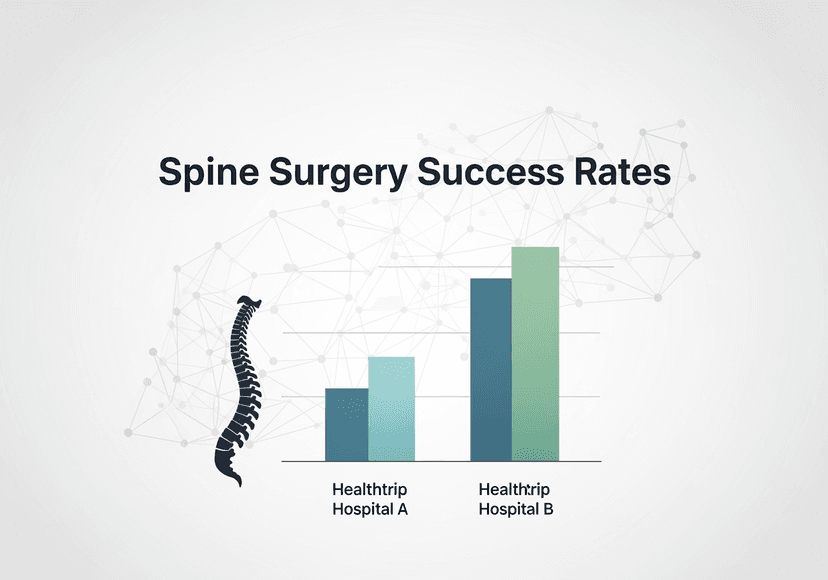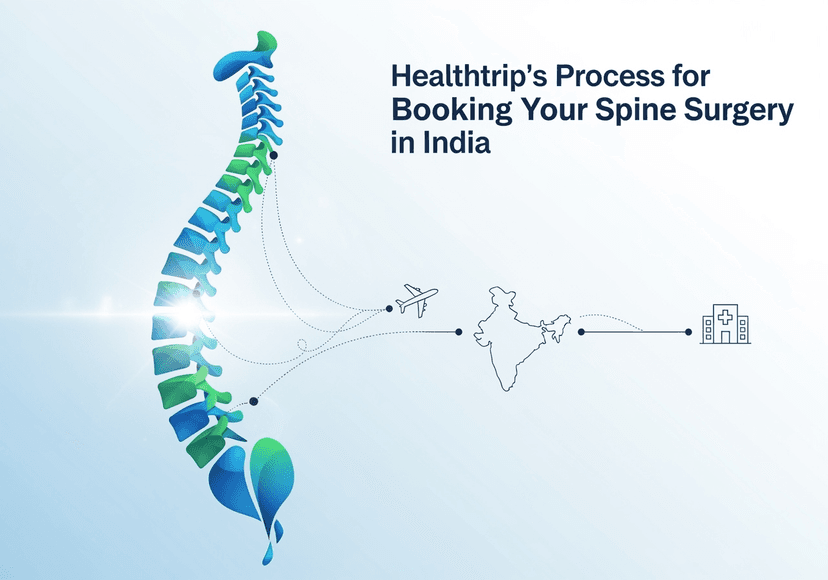
Common Risks in Joint Replacement and How Healthtrip Manages Them
14 Oct, 2025
 Healthtrip
Healthtrip- Common Risks Associated with Joint Replacement Surgery < li>Infection Risk: Prevention and Management with Healthtrip
- Blood Clots After Joint Replacement: Healthtrip's Proactive Strategies < li>Joint Dislocation: Minimizing Risk and Ensuring Stability through Healthtrip's Expertise
- Nerve Damage Concerns: Healthtrip's Approach to Minimizing and Addressing Nerve-Related Complications
- Implant Failure: How Healthtrip Ensures Quality and Longevity of Joint Replacements
- Which Hospitals Does Healthtrip Associate With? < li>Conclusion
Common Risks in Joint Replacement
Infection
One of the primary concerns following any surgical procedure, including joint replacement, is the risk of infection. Infections can occur at the surgical site, either superficially or deep around the new joint. While modern surgical techniques and sterile environments significantly minimize this risk, it's crucial to understand how infections can develop and what precautions can be taken. Symptoms of an infection might include increased pain, swelling, redness, warmth around the incision, fever, and drainage. If you experience any of these symptoms after your joint replacement, it’s vital to seek immediate medical attention. Factors that can increase the risk of infection include diabetes, obesity, smoking, and a weakened immune system. To combat this risk, surgeons at hospitals like Fortis Hospital, Noida, and Memorial Sisli Hospital adhere to strict sterile protocols during the operation. Additionally, prophylactic antibiotics are typically administered before, during, and after the surgery. At Healthtrip, we ensure that you have access to reputable medical facilities with stringent infection control measures and experienced healthcare professionals dedicated to your safety. We also provide comprehensive post-operative care support, including guidance on wound care and recognizing early signs of infection, to help you stay healthy and recover smoothly.
Most popular procedures in India
Blood Clots
Blood clots, particularly deep vein thrombosis (DVT), are another significant risk following joint replacement surgery. DVT occurs when blood clots form in the deep veins, usually in the legs, and can potentially travel to the lungs, causing a pulmonary embolism, a life-threatening condition. The risk of blood clots is elevated after surgery due to reduced mobility and changes in blood flow. Symptoms of DVT may include pain, swelling, warmth, and redness in the leg. To prevent blood clots, doctors often prescribe blood-thinning medications, such as anticoagulants, following the surgery. Mechanical methods like compression stockings and intermittent pneumatic compression devices are also used to promote blood circulation and reduce the risk. Early mobilization and physical therapy play a crucial role in preventing blood clots. Healthcare providers at facilities like Vejthani Hospital and Hisar Intercontinental Hospital emphasize the importance of getting patients moving as soon as safely possible after surgery. Healthtrip ensures that your post-operative care plan includes comprehensive guidance on preventing blood clots, including medication management, exercises, and the use of compression devices. Our team coordinates with your medical team to monitor your condition closely and provide timely interventions if needed, ensuring your safety and well-being throughout the recovery process.
Implant Issues
While joint replacement implants are designed to last for many years, there are potential issues that can arise with the implant itself. These issues can include loosening, dislocation, fracture, or wear and tear of the implant components. Implant loosening occurs when the implant no longer fits securely in the bone, leading to pain and instability. Dislocation happens when the ball of the joint comes out of the socket. Fractures around the implant can also occur due to trauma or weakened bone. Over time, the implant materials can wear down, producing particles that can cause inflammation and bone loss. The lifespan of a joint replacement implant can vary depending on factors such as the patient's age, activity level, weight, and bone quality. Regular follow-up appointments with your surgeon are essential to monitor the condition of the implant and detect any potential problems early on. In some cases, revision surgery may be necessary to address implant issues. Hospitals like Quironsalud Hospital Murcia and Saudi German Hospital Cairo have skilled orthopedic surgeons experienced in performing revision joint replacement surgeries. Healthtrip helps you navigate these potential challenges by connecting you with top-notch medical professionals who specialize in joint replacement and revision surgeries. We ensure that you receive thorough evaluations, personalized treatment plans, and access to the latest implant technologies, maximizing the longevity and success of your joint replacement.
Wellness Treatments
Give yourself the time to relax
Lowest Prices Guaranteed!

Lowest Prices Guaranteed!
Nerve Damage
Nerve damage is a less common, but potentially significant, risk associated with joint replacement surgery. During the procedure, nerves around the joint may be stretched, compressed, or even cut, leading to various sensory or motor deficits. Symptoms of nerve damage can include numbness, tingling, pain, weakness, or even paralysis in the affected area. The severity of nerve damage can vary widely, with some cases resolving spontaneously over time, while others may require medical intervention. The risk of nerve damage depends on factors such as the complexity of the surgery, the patient's anatomy, and the surgeon's experience. Surgeons take great care to minimize the risk of nerve damage during joint replacement, using precise surgical techniques and advanced imaging to guide their movements. In some cases, nerve conduction studies may be performed to assess the extent of nerve damage and guide treatment decisions. Facilities like NMC Specialty Hospital, Al Nahda, Dubai, and Helios Klinikum Erfurt have specialized neurology departments that can provide comprehensive evaluations and treatments for nerve-related complications. Healthtrip connects you with medical centers that offer comprehensive nerve monitoring during surgery and post-operative rehabilitation programs to address any nerve-related issues. Our team ensures that you receive the necessary support and guidance to optimize your recovery and regain function after joint replacement surgery, mitigating the impact of potential nerve damage.
Common Risks Associated with Joint Replacement Surgery
Joint replacement surgery, while often life-changing for those suffering from debilitating joint pain, isn't without its potential complications. It's like embarking on a journey to reclaim your mobility, but understanding the possible bumps in the road is crucial. These risks, while relatively infrequent, are important to consider as you weigh the benefits against the potential drawbacks. Factors such as your overall health, age, and adherence to post-operative instructions can all influence the likelihood of experiencing these complications. Healthtrip is committed to providing you with the information and support you need to navigate this journey with confidence, connecting you with world-class surgeons and facilities prepared to mitigate these risks. We believe in empowering patients through knowledge, ensuring you feel informed and secure every step of the way. Think of it as having a knowledgeable companion guiding you through unfamiliar territory, pointing out potential hazards and helping you find the safest and most rewarding path.
Understanding the Landscape of Potential Complications
When considering joint replacement, it's vital to understand the common risks involved. Infection is a significant concern, as any surgical procedure carries the possibility of bacteria entering the body. Blood clots are another potential issue, as surgery can temporarily increase the risk of clot formation in the legs, which can sometimes travel to the lungs. Joint dislocation can occur, particularly in the early stages of recovery, if certain movements are made that compromise the stability of the new joint. Nerve damage, although rare, is also a possibility, as nerves surrounding the joint can be stretched or injured during the procedure. Finally, implant failure, while uncommon with modern implants, can occur over time due to wear and tear or other factors. Healthtrip ensures that you are connected with hospitals that adhere to the highest standards of safety and utilize cutting-edge techniques to minimize these risks. For example, hospitals like Fortis Shalimar Bagh and Saudi German Hospital Cairo, Egypt, are known for their stringent infection control protocols and experienced surgical teams. These are all part of the assessment that we take on when approaching hospitals to be a part of Healthtrip.
Infection Risk: Prevention and Management with Healthtrip
Infection following joint replacement surgery is a serious concern, and preventing it is a top priority. Imagine your body as a well-guarded fortress, and bacteria are the invaders trying to breach its defenses. Healthtrip understands this and works diligently to connect you with hospitals that employ robust infection control measures, like those seen at Vejthani Hospital. These measures include rigorous sterilization protocols in the operating room, pre-operative skin preparation, and the use of prophylactic antibiotics. Moreover, we assist in the selection of surgical teams with proven track records in minimizing infection rates. Early detection and prompt treatment are crucial if an infection does occur. Healthtrip facilitates access to diagnostic testing and expert medical care to ensure any infection is addressed swiftly and effectively. This might involve antibiotic therapy, further surgery to clean the affected area, or, in rare cases, implant removal. Our goal is to ensure you receive the best possible care to overcome any infection and achieve a successful recovery. We handhold you, making sure you are not alone in this journey.
Healthtrip's Proactive Approach to Infection Prevention
Healthtrip takes a multi-faceted approach to minimizing the risk of infection in joint replacement surgeries. This starts with careful patient screening to identify any pre-existing conditions that might increase susceptibility to infection, such as diabetes or a weakened immune system. We work closely with our partner hospitals to ensure they follow the latest guidelines for infection prevention, as demonstrated by hospitals such as NMC Specialty Hospital, Al Nahda, Dubai. This includes the use of laminar airflow systems in operating rooms, which reduce the number of airborne bacteria. Post-operatively, Healthtrip provides patients with detailed instructions on wound care and hygiene to further minimize the risk of infection. We also ensure you have access to prompt medical attention if you notice any signs of infection, such as increased pain, redness, swelling, or drainage from the surgical site. Think of Healthtrip as your vigilant guardian, ensuring every precaution is taken to protect you from infection and promote a smooth recovery. Furthermore Healthtrip understands all the aspects of the surgery and treatment , hence it is easier to assess and provide solutions to the patients.
Blood Clots After Joint Replacement: Healthtrip's Proactive Strategies
Blood clots are a potential complication after joint replacement surgery, but with proactive strategies, the risk can be significantly reduced. Think of your blood vessels as highways, and blood clots as traffic jams that can disrupt flow. Healthtrip strongly recommends working with facilities that use evidence-based protocols to prevent blood clots, such as those utilized at Memorial Sisli Hospital in Istanbul. These protocols typically involve the use of blood-thinning medications, such as anticoagulants, which help prevent clots from forming. Mechanical compression devices, such as inflatable boots that massage the legs, are also commonly used to promote blood circulation. Furthermore, early mobilization is crucial. Getting up and moving around as soon as possible after surgery helps to prevent blood from pooling in the legs and forming clots. Healthtrip encourages patients to follow their surgeon's instructions carefully and to report any symptoms of a blood clot, such as pain, swelling, redness, or warmth in the leg. Early detection and treatment are essential to prevent serious complications, such as pulmonary embolism. Blood clots can occur in any surgery not only joint replacement, but we at Healthtrip know how to deal with any situation.
Healthtrip's Comprehensive Approach to Blood Clot Prevention
Healthtrip's approach to blood clot prevention is comprehensive and personalized. Before surgery, we work with your medical team to assess your individual risk factors for blood clots, such as a history of previous clots, obesity, or smoking. Healthtrip would ensure the hospital you work with, has measures in place to counter act the risks of blood clots. Based on this assessment, a tailored prevention plan is developed, which may include a combination of medication, mechanical compression, and early mobilization. We also provide patients with educational materials on the signs and symptoms of blood clots, so they can be vigilant and report any concerns promptly. Post-operatively, Healthtrip closely monitors patients for any signs of blood clots and ensures they receive prompt treatment if a clot is suspected. This might involve imaging tests, such as ultrasound or CT scan, to confirm the diagnosis, and treatment with anticoagulants to dissolve the clot and prevent it from spreading. We are committed to providing you with the best possible care to minimize the risk of blood clots and ensure a safe and successful recovery. Mount Elizabeth Hospital in Singapore is one example of our partner hospitals that provides gold-standard preventative measures.
Also Read:
Joint Dislocation: Minimizing Risk and Ensuring Stability through Healthtrip's Expertise
Joint dislocation after a joint replacement can feel like a major setback, like your body is betraying you after all the hard work you've put in. It’s when the ball of the joint comes out of its socket, causing pain and instability. No one wants to go through that, right? At Healthtrip, we understand these concerns intimately, and we've structured our joint replacement programs to significantly minimize the risk of dislocation. Our pre-operative assessments are incredibly thorough; we don't just look at the joint, we evaluate your overall health, muscle strength, and even lifestyle factors. This holistic approach allows our surgeons to tailor the surgical technique and implant selection to your specific needs, reducing the chances of dislocation. We also provide extensive education on post-operative movements and positions to avoid, empowering you to take an active role in protecting your new joint. Think of it as giving you the map and the compass to navigate your recovery journey successfully. It's not just about the surgery; it's about setting you up for long-term stability and confidence in your everyday activities.
But our commitment doesn't end with education. We partner with hospitals that have a proven track record in utilizing advanced surgical techniques and implant technologies designed to enhance joint stability. For example, some of our partner hospitals like Fortis Memorial Research Institute, Gurgaon ( https://www.healthtrip.com/hospital/fortis-memorial-research-institute ) and Max Healthcare Saket ( https://www.healthtrip.com/hospital/max-healthcare-saket ), employ minimally invasive approaches that preserve more of the surrounding tissues, contributing to greater stability. Furthermore, our post-operative rehabilitation programs are designed to progressively strengthen the muscles around the joint, reinforcing its stability and promoting a full range of motion. These programs are tailored to your individual progress, ensuring you're challenged but never pushed beyond your comfort level. We believe in a collaborative approach, where you, your surgeon, and your physiotherapist work together to achieve the best possible outcome. It's about giving you the peace of mind to enjoy life without constantly worrying about your joint giving way.
Also Read:
Nerve Damage Concerns: Healthtrip's Approach to Minimizing and Addressing Nerve-Related Complications
The thought of nerve damage during joint replacement surgery can be quite daunting, akin to imagining a tangled web of wires that could affect sensation and movement. At Healthtrip, we recognize these anxieties and have implemented stringent protocols to minimize the risk of nerve-related complications. Our surgeons are highly skilled and experienced in performing joint replacements with meticulous attention to detail, carefully navigating around delicate nerve structures. Pre-operative imaging, like MRI or CT scans, plays a crucial role in mapping out the precise anatomy of your joint, allowing the surgical team to plan the procedure with pinpoint accuracy. This proactive approach is like having a detailed blueprint before starting construction, reducing the chances of accidentally disrupting any vital pathways. During the surgery itself, advanced monitoring techniques can be used to assess nerve function in real-time, providing immediate feedback to the surgeon and allowing for adjustments to be made as needed. It's like having a built-in safety net, ensuring that everything is proceeding smoothly and safely.
But what if nerve damage does occur, despite all precautions? At Healthtrip, we're prepared for that possibility too. Our partner hospitals, including facilities like Helios Klinikum Erfurt ( https://www.healthtrip.com/hospital/helios-klinikum-erfurt-2 ) and Cleveland Clinic London ( https://www.healthtrip.com/hospital/cleveland-clinic-london ), have access to specialized diagnostic tools and treatment options for nerve injuries. These may include medications to reduce inflammation and pain, physical therapy to restore nerve function, and in some cases, surgical intervention to repair damaged nerves. Our rehabilitation programs are specifically designed to address nerve-related complications, focusing on restoring sensation, strength, and range of motion. We understand that nerve recovery can be a slow and gradual process, requiring patience and perseverance. That's why our team provides ongoing support and encouragement, helping you stay motivated and focused on your goals. We're there for you every step of the way, offering the expertise and compassion you need to navigate this challenging journey.
Implant Failure: How Healthtrip Ensures Quality and Longevity of Joint Replacements
Implants failing—it’s a concern that likely crosses everyone's mind when considering joint replacement. It's like buying an appliance and worrying it might break down prematurely. Healthtrip addresses this concern head-on by prioritizing the quality and longevity of the implants used in our procedures. We partner with leading manufacturers who adhere to the highest standards of materials and design. These implants undergo rigorous testing and are backed by extensive clinical data demonstrating their durability and performance over time. Our surgeons carefully select the most appropriate implant for each patient, considering factors such as age, activity level, bone quality, and overall health. It’s a personalized approach, not a one-size-fits-all solution. We ensure the implant's size and shape perfectly match your anatomy, optimizing its fit and stability. This meticulous attention to detail helps distribute stress evenly across the implant and surrounding bone, reducing the risk of premature wear and tear. Think of it as tailoring a suit to ensure a perfect fit that lasts for years, not just months.
Moreover, Healthtrip works with facilities that prioritize surgical precision. Hospitals like Memorial Sisli Hospital ( https://www.healthtrip.com/hospital/memorial-sisli-hospital ) and Vejthani Hospital ( https://www.healthtrip.com/hospital/vejthani-hospital ) emphasize meticulous surgical techniques that optimize implant fixation and alignment. Our surgeons are thoroughly trained to ensure precise placement of the implant, minimizing stress on the surrounding bone and soft tissues. Post-operative care is just as critical. Healthtrip’s comprehensive rehabilitation programs are designed to promote healthy bone remodeling and muscle strengthening around the implant. Regular follow-up appointments allow us to monitor the implant's performance and identify any potential issues early on. We provide ongoing education on lifestyle modifications and activities to avoid, empowering you to protect your new joint and prolong its lifespan. We strive to provide transparent information about the implants used, enabling you to make informed decisions. Our goal is to ensure you receive a joint replacement that not only alleviates your pain but also provides long-lasting function and stability, allowing you to live life to the fullest.
Also Read:
Which Hospitals Does Healthtrip Associate With?
Healthtrip prides itself on partnering with a network of world-class hospitals to provide patients with access to the best possible care for joint replacement surgery. Our selection process is rigorous, focusing on hospitals with a proven track record of successful joint replacement outcomes, experienced surgeons, state-of-the-art facilities, and a commitment to patient-centered care. We understand that choosing a hospital can be a daunting task, so we've done the research to ensure you have access to top-tier facilities around the globe. In India, we work with renowned institutions such as Fortis Memorial Research Institute in Gurgaon ( https://www.healthtrip.com/hospital/fortis-memorial-research-institute ), Max Healthcare Saket ( https://www.healthtrip.com/hospital/max-healthcare-saket ), and Fortis Hospital, Noida ( https://www.healthtrip.com/hospital/fortis-hospital-noida ), known for their expertise in minimally invasive joint replacement techniques and comprehensive rehabilitation programs.
For patients seeking treatment in Europe, Healthtrip partners with leading hospitals like Helios Klinikum Erfurt ( https://www.healthtrip.com/hospital/helios-klinikum-erfurt-2 ) in Germany and Quironsalud Hospital Murcia ( https://www.healthtrip.com/hospital/quironsalud-hospital-murcia ) in Spain, which offer cutting-edge technology and a multidisciplinary approach to joint replacement. In Turkey, we collaborate with hospitals such as Memorial Sisli Hospital ( https://www.healthtrip.com/hospital/memorial-sisli-hospital ) and LIV Hospital, Istanbul ( https://www.healthtrip.com/hospital/liv-hospital ) known for their innovative surgical techniques and comprehensive patient care. In Southeast Asia, we partner with Vejthani Hospital ( https://www.healthtrip.com/hospital/vejthani-hospital ) in Thailand, recognized for its excellence in orthopedic surgery and rehabilitation. In the Middle East, we are associated with Saudi German Hospital Cairo ( https://www.healthtrip.com/hospital/saudi-german-hospital-cairo ) in Egypt and NMC Specialty Hospital, Al Nahda, Dubai. Our commitment to quality extends beyond just the hospitals themselves. We also carefully vet the surgeons and medical staff at each facility, ensuring they possess the necessary qualifications, experience, and expertise to provide the best possible care. We believe in transparency and provide detailed information about our partner hospitals, including their accreditations, patient satisfaction ratings, and clinical outcomes, empowering you to make an informed decision about your treatment.
Conclusion
Embarking on a joint replacement journey can feel like stepping into the unknown, filled with both hope and a healthy dose of apprehension. At Healthtrip, we understand this, and we're committed to being your trusted guide every step of the way. We don't just offer joint replacement surgery; we offer a holistic, patient-centered approach that prioritizes your safety, comfort, and long-term well-being. From minimizing the risks of infection and blood clots to preventing joint dislocation and addressing potential nerve damage, our comprehensive protocols are designed to provide you with the peace of mind you deserve. We partner with world-class hospitals and experienced surgeons who share our commitment to excellence, ensuring you receive the highest quality care. Our personalized treatment plans, combined with our unwavering support, empower you to navigate your recovery journey with confidence. With Healthtrip, you're not just a patient; you're a partner in your own healing process. We believe in transparency, providing you with all the information you need to make informed decisions about your treatment. We're here to answer your questions, address your concerns, and provide you with the resources you need to achieve a successful outcome. Our goal is to help you regain your mobility, alleviate your pain, and return to the activities you love, allowing you to live life to the fullest. Choosing Healthtrip means choosing a brighter, more active future. Let us help you take that first step.
Related Blogs

Healthtrip's Trusted Hospitals for International Spine Surgery Patients
Detailed guide on spine surgery, featuring doctors, hospitals, risks, recovery,

Who Should Consider Spine Surgery? Healthtrip Expert Insights
Detailed guide on spine surgery, featuring doctors, hospitals, risks, recovery,

Comparing Success Rates of Spine Surgery Across Healthtrip Hospitals
Detailed guide on spine surgery, featuring doctors, hospitals, risks, recovery,

Latest Techniques Used for Spine Surgery in India via Healthtrip
Detailed guide on spine surgery, featuring doctors, hospitals, risks, recovery,

Healthtrip's Process for Booking Your Spine Surgery in India
Detailed guide on spine surgery, featuring doctors, hospitals, risks, recovery,

Best Doctors for Spine Surgery in Top Healthtrip Hospitals
Detailed guide on spine surgery, featuring doctors, hospitals, risks, recovery,










